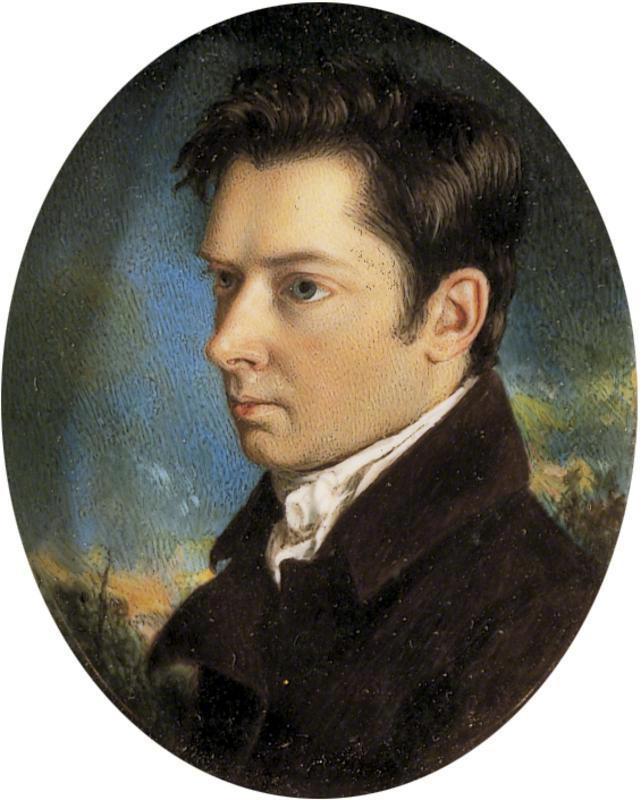William Hazlitt Berühmte Zitate
„Es ist besser, weder lesen noch schreiben zu können, als weiter nichts zu können.“
Table Talk, 1821 - 1822
William Hazlitt: Zitate auf Englisch
"On Corporate Bodies"
Table Talk: Essays On Men And Manners http://www.blupete.com/Literature/Essays/TableHazIV.htm (1821-1822)
“The true barbarian is he who thinks every thing barbarous but his own tastes and prejudices.”
No. 333
Characteristics, in the manner of Rochefoucauld's Maxims (1823)
Lectures on the English Poets http://www.gutenberg.org/files/16209/16209.txt (1818), Lecture VIII, "On the Living Poets"
“A scholar is like a book written in a dead language — it is not every one that can read in it.”
"Common Places," No. 13, The Literary Examiner (September - December 1823)
“Great deeds are usually wrought at great risks.”
"Whether Genius is Conscious of its Powers?"
The Plain Speaker (1826)
“It is hard for any one to be an honest politician who is not born and bred a Dissenter.”
"On Court-Influence" (January 3/January 10, 1818)
Political Essays (1819)
“Our friends are generally ready to do everything for us, except the very thing we wish them to do.”
No. 87
Characteristics, in the manner of Rochefoucauld's Maxims (1823)
“The most learned are often the most narrow-minded men.”
No. 330
Characteristics, in the manner of Rochefoucauld's Maxims (1823)
“Great thoughts reduced to practice become great acts.”
"On the Knowledge of Character"
Table Talk: Essays On Men And Manners http://www.blupete.com/Literature/Essays/TableHazIV.htm (1821-1822)
No. 376
Characteristics, in the manner of Rochefoucauld's Maxims (1823)
“We never do anything well till we cease to think about the manner of doing it.”
"On Prejudice"
Men and Manners: Sketches and Essays (1852)
" On the Spirit of Obligations http://www.blupete.com/Literature/Essays/Hazlitt/SpiritObligations.htm" (1824)
The Plain Speaker (1826)
"On Living to One's-Self"
Table Talk: Essays On Men And Manners http://www.blupete.com/Literature/Essays/TableHazIV.htm (1821-1822)
“To give a reason for anything is to breed a doubt of it…”
"On the Difference Between Writing and Speaking"
The Plain Speaker (1826)
" On the Qualifications Necessary for Success http://www.blupete.com/Literature/Essays/Hazlitt/Success.htm"
The Plain Speaker (1826)
"On Familiar Style" (1821)
Table Talk: Essays On Men And Manners http://www.blupete.com/Literature/Essays/TableHazIV.htm (1821-1822)
“It is well that there is no one without a fault; for he would not have a friend in the world.”
No. 66
Characteristics, in the manner of Rochefoucauld's Maxims (1823)
“The way to procure insults is to submit to them. A man meets with no more respect than he exacts.”
No. 402
Characteristics, in the manner of Rochefoucauld's Maxims (1823)
"On Paradox and Common-Place"
Table Talk: Essays On Men And Manners http://www.blupete.com/Literature/Essays/TableHazIV.htm (1821-1822)
"On the Character of Cobbett"
Table Talk: Essays On Men And Manners http://www.blupete.com/Literature/Essays/TableHazIV.htm (1821-1822)
No. 60
Characteristics, in the manner of Rochefoucauld's Maxims (1823)
Lectures on the English Poets http://www.gutenberg.org/files/16209/16209.txt (1818), Lecture III, "On Shakespeare and Milton"
"On the Ignorance of the Learned"
Table Talk: Essays On Men And Manners http://www.blupete.com/Literature/Essays/TableHazIV.htm (1821-1822)
“Indolence is a delightful but distressing state; we must be doing something to be happy.”
"On the Pleasure of Painting"
Table Talk: Essays On Men And Manners http://www.blupete.com/Literature/Essays/TableHazIV.htm (1821-1822)
“If you think you can win, you can win. Faith is necessary to victory.”
"On Great and Little Things"
Table Talk: Essays On Men And Manners http://www.blupete.com/Literature/Essays/TableHazIV.htm (1821-1822)
No. 389
Characteristics, in the manner of Rochefoucauld's Maxims (1823)
